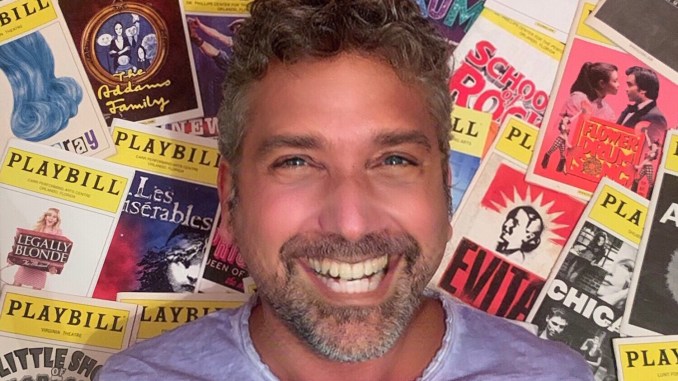
 At a time when theaters remain closed, author Eddie Shapiro is giving readers a front-row seat to 19 of the most prolific leading men on Broadway.
At a time when theaters remain closed, author Eddie Shapiro is giving readers a front-row seat to 19 of the most prolific leading men on Broadway.
On sale May 3 from Oxford Press, A Wonderful Guy features interviews and intimate conversations with Jonathan Groff, Cheyenne Jackson, Joel Grey, Ben Vereen, Gavin Creel, Raúl Esparza, Norm Lewis, Christian Borle, and many more.
A follow-up to Nothing Like A Dame, Shapiro’s collection of interviews with iconic women of the stage, A Wonderful Guy features career-spanning discussions full of incredible stories and insightful reflections. I chatted with Shapiro to celebrate the book’s release.
AKN: Of all the men you interviewed for this book, whose answers were you most surprised by? Why?
ES: I was constantly surprised by different people for different reasons but Will Chase comes to mind; he was very open and honest about the financial realities of the business. Money is a topic a lot of people shy away from. Not Will!
How did you decide on who to interview? How did you curate the book?
All the subjects had to have a full career of musicals. As much as I love people like Hugh Jackman, Alan Cumming and Neil Patrick Harris, those are actors who occasionally do musicals but whose primary career is elsewhere. And the subjects all had to say “yes!” Not everyone did!
What’s something that Nothing Like a Dame taught you as a writer that you applied to this new book?
I am not the story. So my thoughts and opinions are only relevant if they help elicit thoughts from the subjects. Sometimes I listened to the Dame conversations and heard robust and interesting conversation, but it turned out that I was doing the bulk of the talking. The subject would agree or disagree, but the ideas were coming from me. That was an important thing to realize and get better at avoiding.
What’s the first story you think of when I ask what your favorite story from the book is?
It’s too long to tell… but check out the story of the night Christopher Sieber took over as Cinderella’s Prince—mid show, mind you—in the Into the Woods revival. That’s for comedy. And for poignancy, Brian Stokes Mitchell and the recognition, during the run of Ragtime, that his work and social justice are inexorably linked.
What is the show that turned you into a musical theater fan?
The first one I saw was The Magic Show, and other early ones included Annie, A Chorus Line, and the all-Black Guys and Dolls. But I don’t think it’s about the show so much as the age—capture a kid at six or seven or eight when they have the time to sit and listen to a cast album again and again and again and you’ve got yourself a fan for life.
What does the reopening of Broadway look like and mean to you?
It means so much to so many. I keep thinking about the ushers. Some of those people have worked in their individual theaters for 30 or 40 years! Crew! Musicians! The people running publicity campaigns for the shows! Agents! Critics! Many actors, while they are the face of the business, have been able to use their skills elsewhere this past year, but that’s harder for these backstage and front of house people. I am excited for them to be back at their posts!
Are there any primary takeaways that you hope readers have from your book?
I won’t try to imagine reader take-aways, but I can tell you mine at the end of the process. It was the same one I had after Dame: There is no such thing as security in this business. No one feels safe. No one feels like they don’t have to stress the future. I came in thinking that once you get to a certain level, that anxiety is alleviated. WRONG!
Is there anyone additional you wish you could have interviewed for the book?
There are several. George Hearn was initially interested but then became unavailable. And the great John McMartin agreed to do this, but passed away before we could chat. And there are a few others who weren’t interested, as much as I begged and attempted to bribe. I delivered cupcakes, for Pete’s sake!
What are some ways that you think people can support the theater community during the pandemic?
Buy tickets to every streaming concert or show that you can afford! Every one of those is keeping people afloat.
Is there anything additional you want to add that we didn’t discuss?
This book, and Dame before it, really do create a picture of the last six decades of what it means to be a musical theater performer—highs and lows—and to be part of the greater community of theatrical storytellers. I feel tremendously honored that all of these people trusted me to help share their stories.
BUY A WONDERFUL GUY NOW